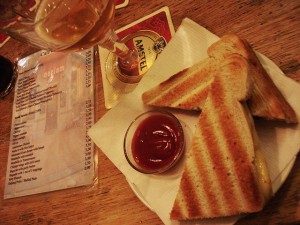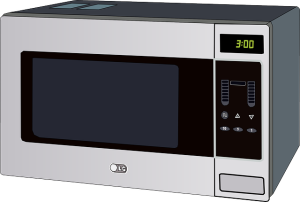toasted ham and cheese sandwich ![]()
[noun]
[de tos-ti, de tos-ti’s]
 There’s not really an equivalent in English for “tosti”. In French, there is, though: “croque-monsieur”. “Tosti” apparently originates from the Italian “tosto” (from which “tosti” is the plural form), which is short for “tostato”, which is the past particple of “tostare”: to toast.
There’s not really an equivalent in English for “tosti”. In French, there is, though: “croque-monsieur”. “Tosti” apparently originates from the Italian “tosto” (from which “tosti” is the plural form), which is short for “tostato”, which is the past particple of “tostare”: to toast.
(Photo: Heather-D (flickr.com) – some rights reserved.)
A “tosti” is two slices of bread, by default with cheese and ham in between,
toasted all together. The ingredients may vary, but cheese (of any
kind) seems to be mandatory. If you order a tosti without further
specification, you will receive a ham and cheese tosti, mostly served with a small bowl of ketchup.
Examples:
– “Ik wil graag een tosti.” – “Ham en kaas?” – “Ja, graag.”
(“I would like to have a tosti.” – “Ham and cheese?” – “Yes, please.”)
– “Lara maakt de allerbeste tosti’s!! Met Franse salami, tomaatjes en oude kaas…”
(“Lara makes the absolute best tostis!! With French salami, little tomatoes and old cheese…”)
– “Ober, mag ik mayonaise bij mijn tosti in plaats van ketchup?” – “Vanzelfsprekend, meneer.”
(“Waiter, can I have mayonaise with my tosti instead of ketchup?” – “Naturally, sir.”)
Related words:
– Tosti-apparaat: toaster device (for making tostis) [noun] [het tosti-apparaat, de tosti-apparaten].
– Tosti-ijzer: toaster device (for making tostis, lit.: tosti iron) [noun] [het tosti-ijzer, de tosti-ijzers].
– Broodrooster: toaster (for toasting slices of bread) [noun] [het broodrooster, de broodroosters].
– Roosteren: to toast [verb] [roosterde, geroosterd].
Extra:
You have a “broodrooster” (toaster) and a “tosti-apparaat/ijzer”. They are different devices. The former is a device used to toast bread, especially by exposure to electrically heated wire coils. The latter is a device for making tostis by heating/toasting a ham/cheese sandwich between two metal plates. These plates are usually heated electrically.

 “Toveren” is often used in its literal sense: witches and sorcerers do it all the time 🙂 It can also be used when someone does something which seems impossible.
“Toveren” is often used in its literal sense: witches and sorcerers do it all the time 🙂 It can also be used when someone does something which seems impossible. If you think that “magnetron” is the Dutch translation of the name of a character from the
If you think that “magnetron” is the Dutch translation of the name of a character from the 
